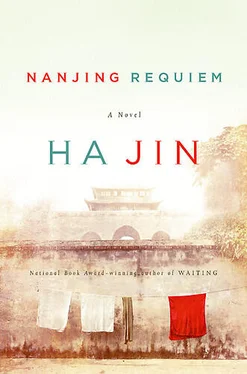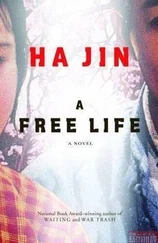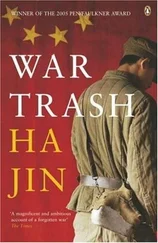Minnie said to Big Liu, “Come, let’s go out for some fresh air.” But he didn’t budge, saying he had a migraine.
So Minnie and I went for a walk outside the campus. She was wearing a thick velvet hat and a woolen cloak while I had on blue cotton-padded jacket and pants, with a purple scarf around my neck. Her calf-high boots were the pair she’d bought in Moscow six years before. It was warm for a winter day, and the sun was sinking beyond the ridge of the hill ahead of us. Rooks were circling in the air and shrieking like crazy, while a pair of white-bellied magpies fluttered their feathers and cackled in the top of an old acacia. Along the road most of the houses were deserted. Some were roofless, destroyed by fire, and some no longer had doors or windows. All the pigsties and sheep pens were empty too. At the foot of the hill perched a small village that showed no trace of life, though it was time for cooking supper. As the two of us walked along, an old peasant, with a wisp of beard and only three or four teeth left in his mouth, appeared, lumbering over from the opposite direction. He carried a bundle of branches as firewood.
“Good day, Principal,” the old man said to Minnie, and came to a stop.
“How are you doing?” she asked, apparently knowing him by sight, as did I.
“No good, just getting by.”
“How’s your family?”
“My wife went away with my son and daughter-in-law to the north of the river. I miss my grandkids terribly.”
“When will they come back?” I asked.
“As long as the Japs are here, they won’t come back. Matter of fact, most of our neighbors lit out too. Only a bunch of old folks stayed in the village to look after the homes.”
“That means the families will come back sooner or later,” Minnie said.
“Hope so.”
The old man left, and we continued west. A few minutes later we entered a small valley, where we came upon a pond two acres wide, around which were many bodies. The water was still pinkish in spite of the recent rain and a creek feeding the marshy pond. More than a dozen corpses floated in it, puffed like logs. I realized this was an execution site.
Most of the dead were men, though there were some women and children too, all with bullet or bayonet wounds. Many of the men had their pants stripped down and their hands bound with iron wire; a few had their necks slashed. One woman, still wearing suede boots wrinkled at the ankles, had a breast cut off and a cartridge case stuck in each nostril. A small boy, stabbed in the tummy and his head smashed in from the side, still held a squashed bamboo basket. Beyond him lay a middle-aged man, perhaps his father, shot in the face and his hands tied with gaiters; his right hand had a sixth finger.
“The Japanese are savages!” I said.
“We should count how many were killed here,” Minnie suggested.
“All right.”
Together we began counting, walking clockwise along the waterside. Minnie used a stick to part the reeds and pampas grass that obscured some corpses, while I recorded our count in my small notebook. Now and then I pinched my nose shut because of the overpowering stench. Minnie wore a surgical mask, which she carried in her pocket whenever she went out nowadays. In total, we found 142 bodies, among them 38 women and 12 children. There might have been more under the water, but it was too muddy to see through.
“A monument should be put up here,” Minnie said.
“There are execution sites everywhere. This one is nothing by comparison,” I replied.
“Still, this should be remembered.”
“Most people are good at forgetting. That’s a way of survival, I guess.”
We fell silent. Then she said, “History should be recorded as it happened so it can be remembered with little room for doubt and controversy.”
I didn’t respond, knowing that in her heart she resented the Chinese fashion of forgetfulness based on the understanding that nothing mattered eventually, since everything would turn into dust or smoke — even memories would fade away. Such an idea might be insightful, but one could also argue that many Chinese seemed to exploit forgetfulness as an excuse for shirking responsibility and avoiding strife. This was probably due to the influence of Daoism, which to Minnie was more like a secular cult. By contrast, she respected Confucianism — instead of indulging in escapism, Confucius advocated order, personal duty, and diligence. Yet to her, Confucianism, Daoism, and Buddhism were all secular religions. What this country needed was Christianity, she often told me, and I shared her belief.
Suddenly a large silver carp surfaced with a splash and swam away, its back cleaving the water with an expanding V. I said, “Fish must be getting fat in here.”
“And the grass will grow thicker. What a crime!” Minnie said.
Originally we had planned to go all the way up to the ridge of the hill and from there to catch a full view of Mochou Lake beyond the city wall, but now we were in no mood for that anymore. We turned back. On our way down, we discussed how to present the petition to the Japanese authorities and the newly established puppet municipality. I wouldn’t say a negative word about this matter anymore, since it was already under way. We were both against publishing the petition in a newspaper, afraid of incensing the Japanese unnecessarily. In the distance, a squadron of heavy bombers emerged like a school of whales in the waves of clouds, heading back for base after dropping bombs on the Chinese lines in the northwest, where a battle was in full swing.
Minnie said, “I wish the Christians in Japan knew what their countrymen have been doing here.”
“Even if they knew, they might not do anything to stop them,” I said, wondering how my son, Haowen, might have felt when he saw the Japanese euphoria. He must have encountered public gatherings and parades in celebration of the Imperial Army’s victory. Was he heartbroken or crazed by them? Was he worried about us? Did he miss home? Could he still concentrate on his studies? Then I curbed my woolgathering and told Minnie, “I read in newspapers that all of Tokyo had turned out to celebrate the fall of Nanjing. Even small boys tossed their caps into the air, and women wore slogans across their chests, sang and danced in the streets, fluttering the sun-disk flags. Our calamities are their good fortunes.”
“That’s because they were ignorant of the truth.” She’d also heard about the celebrations all over Japan, and that was why she couldn’t stop imagining ways to deflate their jubilation. She had once suggested to the Safety Zone Committee that they rent a plane and drop a ton of truth-bearing pamphlets over Japan. That had brought out peals of laughter from the other foreigners. Lewis even joked that if Minnie could find a plane in Nanjing, he’d fly the mission, and Searle volunteered to be an airborne leafleter.
We stood for a while on the hill slope. From there we could see the Yangtze glittering like lava in the northwest, against the crimson sunset. On the waterway a handful of sampans were sailing upstream almost motionlessly.
FOR A WEEK Minnie had been working on a report to Jinling’s board of founders in New York. She was required to keep an official diary that would be mailed to our headquarters in New York at the end of each semester. In addition, she needed to send in a monthly report, so toward the end of each month she would work on the lengthy piece of writing. I wouldn’t trade places with her even if they paid me twice her salary, though I could write and even kept a personal diary. In recent weeks Minnie often showed me her writings, and I could see that she couldn’t be completely candid about what was happening. Besides the politics within our college, the Japanese monitored the international mail. She knew that other eyes, some hostile, would read the pages.
Читать дальше











